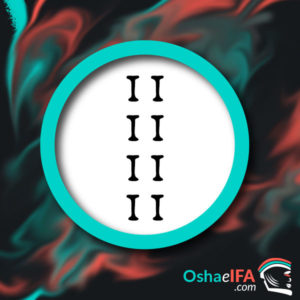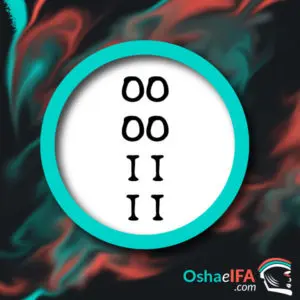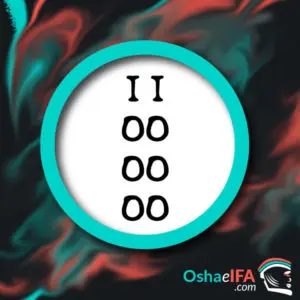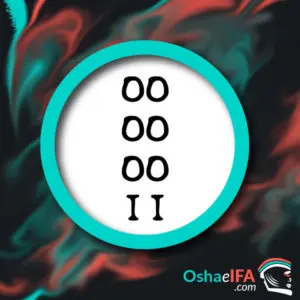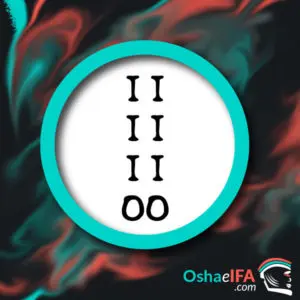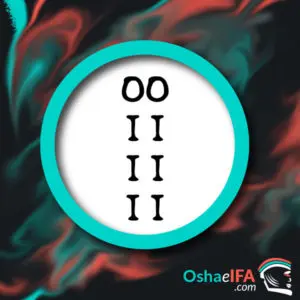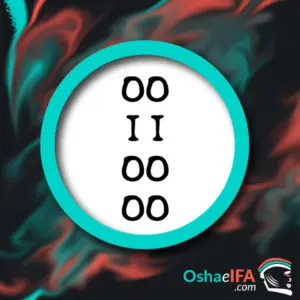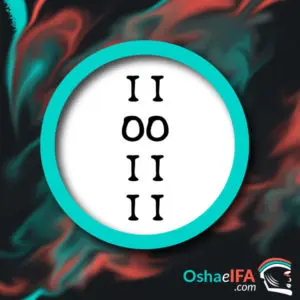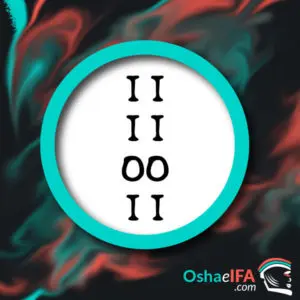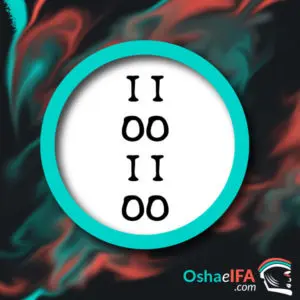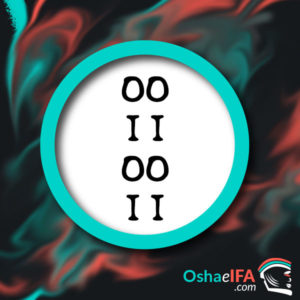Otrupon Meyi or Oturupon Meji: Meaning, tips, pataki and more

Otrupon Meyi marks constant warfare. Those born under this Odu, are distrustful and at the end of life they live alone, away from people and the world. They are dominant and strong, you get to gain respect for them.
They are intelligent, for the bad they are terrible, because they have no conscience of the bad thing; when they are enemies of someone they always believe they are going to harm them, they doubt everyone. The dead man speaks to them constantly and warns them of the enemy. If they do wrong, their Guardian Angel punishes them. Sometimes they lose their memory and turn to their secret and extra sixth sense that they have developed and apply through Egun, because as they are Egun's foremen they use it to solve what they cannot see.
Ifá wants this person to be well. He must sacrifice for success. Someone will take it somewhere. There, people will recognize him for the wealth, children, but he will have to offer a sacrifice.
What is born in the odu of Ifa Otrupon Meyi?
- The dragging of the four-legged animals after they have been sacrificed to the Oshas or Orishas, such as towards the tiger. "EKUN MENI EKUN MENI KI EKUN MERAN" (The tiger drags its food, so do we).
- Dreams.
- The uterus and the stomach.
- Hernias, tumors, diarrhea, white discharge, fibromas.
- The fish, the parrots and the spiders.
- The blockade and ostracism.
- The ceremony in which the Awó who is born snatches his arms from the hands of the godfather and then dances in the Igbodun of Ifá.
- Let Shango eat goat for the first time and together with Eshu-Elegba.
- Born: In the children of Elegba sick life.
- Fatness.
- Olofin's hierarchy over all divinities, including Orúnmila.
- Pygmies and Dwarves.
- The scientific nomenclature.
- The white lie.
- The fact that children at birth come upside down.
- Put Shango at the door of the Igbodun (shilekun Igbodun ilé), because without Shango's protection, the King cannot mount the throne.
- The Prohibition of this Odu «Otrupon Meyi» from smoking by Shango, who burned all the yams (In Igbodun).
- Touching the ground with the tips of the fingers, then to the chest, since Shango destroyed the Earth, the Awoses cried when the Odu came out in Atefá.
- The destruction of humanity.
- Make Paraldo with a broody hen, which represents Iku.
- Refrain from serving or begging other people's heads, regardless of the pretext.
- That Orúnmila transmitted wisdom and Science: intelligence (Ologbon) launched Ifá and came to the World.
- Let the fruits fall from the trees when they ripen. The Odu reflects the ripening of the fruits.
- The bomb fruit or Papaya.
- The prohibition of begging the head with snails (Igbín) to the children of Oshún.
What is the sign Otrupon Meyi talking about?
- The song to their ancestors.
- Put the iñales to Oshas and Orishas.
- Let Ejiogbe and Otrupon Meji go down to Ife together.
- Here: Olofin sent the universal flood.
- Otrupon Meyi for Osobo, in the marriage everything falls apart (The jars to Ogún for the hunter).
- It is the Odu of the Devil.
- It is the end of one process and the beginning of the other.
- The person is reserved (blockade and ostracism).
- It's the white lie.
- The Earth offended Orúnmila.
- Odu diseases are: continuous colds, white discharge and fibroma, uterine cancer and dysmenorrhea, scrotal hernia, elephantiasis, boils, tumors, diarrhea, stroke, heart attack, shortness of breath and alcoholism, memory loss , stroke, internal operations, hydrolysis, diabetes, cervical osteoarthritis, rheurosis, obesity.
- The Odu is known by the secret name of Ilero (solid earth), it invokes the solid earth.
- Speak the sons of Eshu-Elegba, Eshu Añawi and his followers.
- It is the biological evolution of primitive man.
- He says that if a brother kills another and who he will not kill.
- Otrupon Meyi speaks of menstruation in women as a gossip.
- The Vulture cannot stop eating dead meat and that temptation destroys it.
- The beautiful bird Egherun could not resist the temptation to eat the ripe Ikines and they accuse her of theft.
- The disease of Humanity speaks for the children of Obatala could not resist the temptation to eat meat and not listen to Egun.
- Here: Obatalá covered Oshún with a white sheet, when he lost consciousness due to sorcery (Ogú) of Osanyin.
- Smallpox went to war.
- The tiger and the tigress speak in sex, when the latter bit him and lost his will with her.
- Obatalá played dead, to see if Shango knew.
- Eshu-Elegba (calf) is given yearling.
- That the most important virtue of Otrupon-Meji is having patience and knowing how to endure.
- The goat, the fish, the coyote and the spider speak.
- The Egun regret their actions in life
- The son committed suicide and like Egun he is sorry.
- The person has a grimace, trick or nervous tic.
The sign Otrupon Meji points out:
- Otrupon Meji is Egun's foreman.
- Ujá, Ogún's wife, had a child for the first time in her life and it was with a lover.
- It is the Ifá of the crouching tiger.
- Entering empty houses is prohibited.
- The ugly vulture blackmailed the most beautiful bird in the bush to live with her.
- Oshún begged his belly with pumpkin.
- The man always returns to his legitimate wife.
- The Mullidor, the Wildcat and Orúnmila speak, all envied.
- The war of Oshún and Igbin (Eson) speaks for Ashikuelú, husband of both.
- The wise man adores wisdom and the fox hunts her, that's why everyone has his own thing.
- Ashikuelú insulted Oshún, his wife.
- The monkeys betrayed Orúnmila.
- The serpent was watching Orúnmila to kill him.
- Osanyin must be received.
- Orúnmila left the World forever and left the Ikines as his representation.
- Otrupon Meyi does not sit in a fixed place in his trading company.
- Change your name or do not prevail for refusing to do EBO.
- He says that when there is war, the soldier does not sleep. Odu of constant warfare.
- The Awó must sit at the table to eat with a lightning stone.
- The herbs are: cedar, good grass, marigold, cob, sage, broom, bomb fruit.
- The breasts are supported by the body.
- In Otrupon Meji, round and thick reigns supreme.
You may also like: Shango, history and characteristics of this Orisha.
Recommendations of the Otrupon Meji sign:
The goat that is offered to Shango with Eshu-Elegba, is white and two red roosters.
Do not pick herbs in the mountains because your life may be in danger (Orúnmila and the snake).
There are no links, nor are there visits to meeting centers, groups or societies, much less where spiritualism is worked (Orúnmila and the monkeys who betray him).
Feed all 4 corners.
If this the sign of Ifa Otrupon Meyi comes for a woman who thinks to abandon her husband who is older than her, she will be advised not to do so because she will remain from one place to another, her happiness is next to that man.
The sick person will have to undergo surgery on the belly or breasts, clean themselves with two pumpkins, that's what Oshún did.
For Osobo Otrupon Meyi makes constant wars, they are distrustful, they think that others want to harm him, they are disobedient to the advice of their Guardian Angel.
Enemies damage their food or drink (don't drink).
If you distanced yourself from your Ifá Godfather or benefactor, go back to him and make amends.
It is forbidden to eat bomb fruit, okra, pumpkin, rooster, guinea pig, eel.
It is invested in the present to collect fruit in the future (Well, the fruits fall when they are ripe, so this is safe).
The Awó must not allow himself to be bitten by the woman, because he loses his will before her.
Sayings of the Odu of Ifa Otrupon Meyi:
- He who makes the rope tight cannot be a farmer.
- You cannot, at the same time, wash your hand and take the earth.
- The earth does not sit on the head of a child.
- The house with a roof is more beautiful but much warmer.
- The swollen river spills over the grasses for a long time.
- He who has the rope does not braid the earth.
- The dry straw dies and the new is born.
- The spider dies and its children begin.
- Without the protection of SHANGO, the King cannot mount the throne (fundamental in the ceremonies of the shilekún ilé of the Igbodun).
- If you want to see blood, you will see blood (Obiní's menstruation).
- When there is war, the soldier does not sleep.
- When memory fails, I turn to my secret. Cheating and falsehood haunt me.
- OKE, hatred can do nothing against you, unalterable holy mountain.
- You yourself are the fire-eyed tiger, there is no other.

Says Ifa Otrupon Meyi:
Be careful around people who want to hurt you in food. Do not eat or drink in anyone's home. There is someone who deceives you. They are waiting for you to hurt you. Avoid confronting Iku, go to your Godfather and ask for his forgiveness. He has an internal disease that when he least thinks about it, it will come out suddenly. Their envy of you causes traps. You must receive ORULA. Don't cut herbs in seven days. There is a dead man who wants to take it away. Take care of your front door. He has a disease caused by Ogú.
An older person falls in love with her. If they send you to look for a doubtful place, do not go, they are going to kill you, a friend can take you deceived to that point. Do not fight with a brother for an inheritance or property. Do not go to the spiritual center near your home, lest you be late. Scrub your house and join erita merin. You want to cheat on your husband with an old man, you will have money but they can kill you, do EBO. You are an absolute person and you like to command. Give thanks to YEMAYA, OSHUN and YANZA, you have to do Santo.
Prayer of the Odu Baba Otrupon Meyi:
OTRUPON MEYI OBORO NI SHORO LOWON NI FEDERE NOSHODO OKU ENI
FADERE BABALAWO ALL DECEASED KUTU ASHORO EKU OLORO TOROSHE
ADIFAFUN EKUN.
Suyere Oddun Otrupon Meji:
OÑI LASHORO OÑIO
OÑIÑI OÑIÑI LASHORO EKUN
EÑIFE FUN LASHORO EÑI EÑI
LASHORO ÑIO.
You may also like: Treaty of Ifa, Oddun Ika Meyi
Ebbo of the Odu Otrupon Meyi Ifa:
EBO: Euré Meji, addé meji, akukó, long cuje, opolopo owó.
Work to take. Sage leaves on the right and left.
EBBO: 1 akukó, 1 stinger, erán malú, 11 otá of the house, asho fun fun, asia meta, he throws himself in a hole.
Tips from the oddun of Ifa Otrupon Meji:
Beware of the temptation of the flesh.
It is Odu of Abikú.
You don't eat bomb-fruit, okra, pumpkin, rooster, guinea pig, or eel.
It is a very difficult Ifa Odu, you have to do a lot of Ebó.
You cannot be stubborn, you can lose your life.
You must put on the Ide and receive Orúnmila.
Oshún is given 2 chickens, he cleans himself with them and goes to the river, and 2 pigeons are given to him at the door of the house.
It is said in African roads that in Atefá (Otrupon Meyi) a duck is given to Ifá, a turtle to its head and a goat to Eshu-Elegba and receive Orun, Shango, Ogún, Olodun, Shakuana and dedicate themselves to the priesthood of Ifá , teach your disciples and you will have quite a clientele.
His brother plots to kill him, for which he must sacrifice a banana to his head.
You should not serve other people's bosses, offer Eshu-Elegba a goat and dance with his head.
He will marry someone by duress, so that it does not last he must sacrifice 2 roosters in an open road junction.
Your wife is stronger than you and plans to damage your business. With goat to Eshu-Elegba, it is discovered or not done.
You owe humanity a debt of gratitude for seducing someone else's wife, be satisfied with what you have.
He talks about trips where he will have to cross the sea, he must first sacrifice Olokun (Orúnmila crossed the sea by leaving Earth forever).
You will only be saved from the many enemies during your life through sacrifice.
Do not curse your fellow men, Ogún did it with his wife and fell ill, Uja is saved because the seducer had to pay a dowry to Ogún, with goat, turtle, rooster and dog, and leave him at a crossroads.
Don't get wet, you're late. Respect the elders.
Here the person is commanded to start a new life by taking a bath with the leaves of the Odu: cedar, canistel and drum stick at the door of his house, to erase his dark and unhappy past.
Meaning of the Sign of Ifa Otrupon Meyi
When the owner of the Odu does wrong, his Guardian Angel gives him hot flashes and flushes.
It was in the Oddun of Ifa Otrupon Meyi that Orúnmila, who was fulfilling the mission of Olodumare, was forced to leave Earth, because he felt offended by its inhabitants. The evil and ignorance of the human race had appeared on Earth, and the deities moved to other dimensions unknown and inaccessible to humans. So Olodumare made the decision to send the Deluge, to devastate and clean its surface. Diseases, plagues and mass deaths proliferate here.
Ifá from the beginning of a process to finish another.
The dry straw said to the green one: "When I end my life, you begin yours."
The spider said to his children: "When you begin to know life, I will die."
The Odu points out that when feeding the Saints, it is said:
ODI OLUKURU KURU
EÑI EÑI LAWO ADEN LAWO
EÑI EÑI LAWO ADEN LAWO
EKUN MENI EKUN MENI
KI EKUN MERAN OR KI EKUN MAKURA AWO
This means: The tiger drags its food, we do the same.
In the Odu Eshu-Elegba he had no neck or head, but thanks to Orúnmila he did.
Ebó is always made with round fruits, to reign over the round. The Ebbó must be taken to dumped by the mother, if she is alive; if she is dead, she must be taken to her grave.
Here primitive man evolved, so that the improved spirit could express itself. Also in this sign governs human feelings related to lack of apprehension, detachment from the family, isolation, introversion of the individual, and lack of honesty.
Treaty of the Oracle of Ifa oddun Otrupon Meyi
Through this Oddun of Ifa, Orúnmila suffered misery.
OLOFIN gave the mat to ORULA's mother, as she asked for it for her son, who was recognized thanks to his mother and OLORUN.
Ifá of slavery in women.
They take food to a grave in the cemetery, they cast sorcery on the food (That's what they do to Oshún).
They are bosses and command many people, but because they are cheaters or greedy, they get lost and are left alone.
They carry a reputation as bad and accuse him of killing, for the bad they are terrible, they have no conscience when they do harm. They suffer from the chest and have to make Ebo with a jicotea (Ayapá) for Eshu-Elegba or Osanyin, rooster and pins at the tip of the mariwó. Do not go to wakes or treats, because your enemies can kill you, they can wound you with a knife.
The Odu Otrupon Meyi indicates whiteness, dead, goodness, play, expanse of water, paternal passion, requiem songs.
He talks about a son who commits suicide and how Egun is sorry.
She is a female Odu, daughter of Olokban. Their colors are: red, black and studded. The day of the week is OYO OTI (Friday). The planet is Venus. Its metal is copper. The colors to dress are green and white checkered. It is an Odu of many tests. It is known by the name of Ilere (mainland).
In Otrupon Meyi, Olofin sent the Flood, because the Earth offended Orúnmila.
His own subordinate betrays him and confronts him to eliminate him.
Orúnmila was going to the ABENUSHURU land and made Ebo with a bag, to hang it where Eshu-Elegba was. The Ebó is with a dove for luck, so that the bad does not hang on it.
ASHIKUELU cheats on OSHUN with ESON, a prostitute, and then mistreats her and casts Ogú out.
Los Iñales a los Oshas is what ORULA recommended that men eat to maintain health.
Odu Otrupon Meji Ifa Code of Ethics:
The Awó's trust is the woman of his house.
Pataki of the sign of Ifa Otrupon Meyi:
The trap of the monkeys to ORULA
He was an Awó who went to the land of the Monkeys and when he arrived he would guess at everyone, for which he quickly acquired a lot of fame.
The King of the Monkeys, when he found out, realized that this Awó did not suit him in his land, because it overshadowed him and decided to eliminate him and thought of killing him.
The King of the Monkeys prepared a trap, which consisted of telling the monkeys to comment among the people that he had died and to invite the Awó to the wake.
That night, there were many people at the wake and the Awó, upon receiving the news, became a Bear and this Ifá, Intori Osobo, was seen warning him to beware of a trap. The Awó became EBO.
Later in the evening, the Awó arrived at the wake and when he reached the box where the King rested, the Awó began to pray a prayer of this Ifá and the King, who pretended to be dead, sneezed. The Awó ran out of there and the King of the Monkeys continued sneezing.
As it was quite late, the sleeping Monkeys woke up with a start and one of them closed the door of the house and another took the key of the house door to give it to the King, trying to lock the Awó, which was ORUNMILA.
Another monkey, groggy from sleep, mechanically slapped the one who was holding the key in his hand, which jumped out of the room and all of them were imprisoned.
Otrupon Meyi Ifa Traditional Nigerian
ÒTÚRÚPÒN MÉJÌ
Òpèbé Awo Ese
A day fún Esè
N tòrun bò wálé ayé
Ebo n won ni or se
Esè yes gbébo nbè
Ó rubo
Òpèbé or dé
Ìwo lawo Ese
A ì í gbìmòràn ká I tesèé lè.
Ifá advises this person to offer sacrifice. He will become an important person in life.
Òpèbé is the priest of the Leg
Who consulted the Leg
When the Leg was coming from heaven to earth
They advised him to offer sacrifice
And he did
Òpèbé you are here
You are the priest of the Leg
Nobody plans any events and excludes the Leg.
The 16 Mejis of Ifa:
